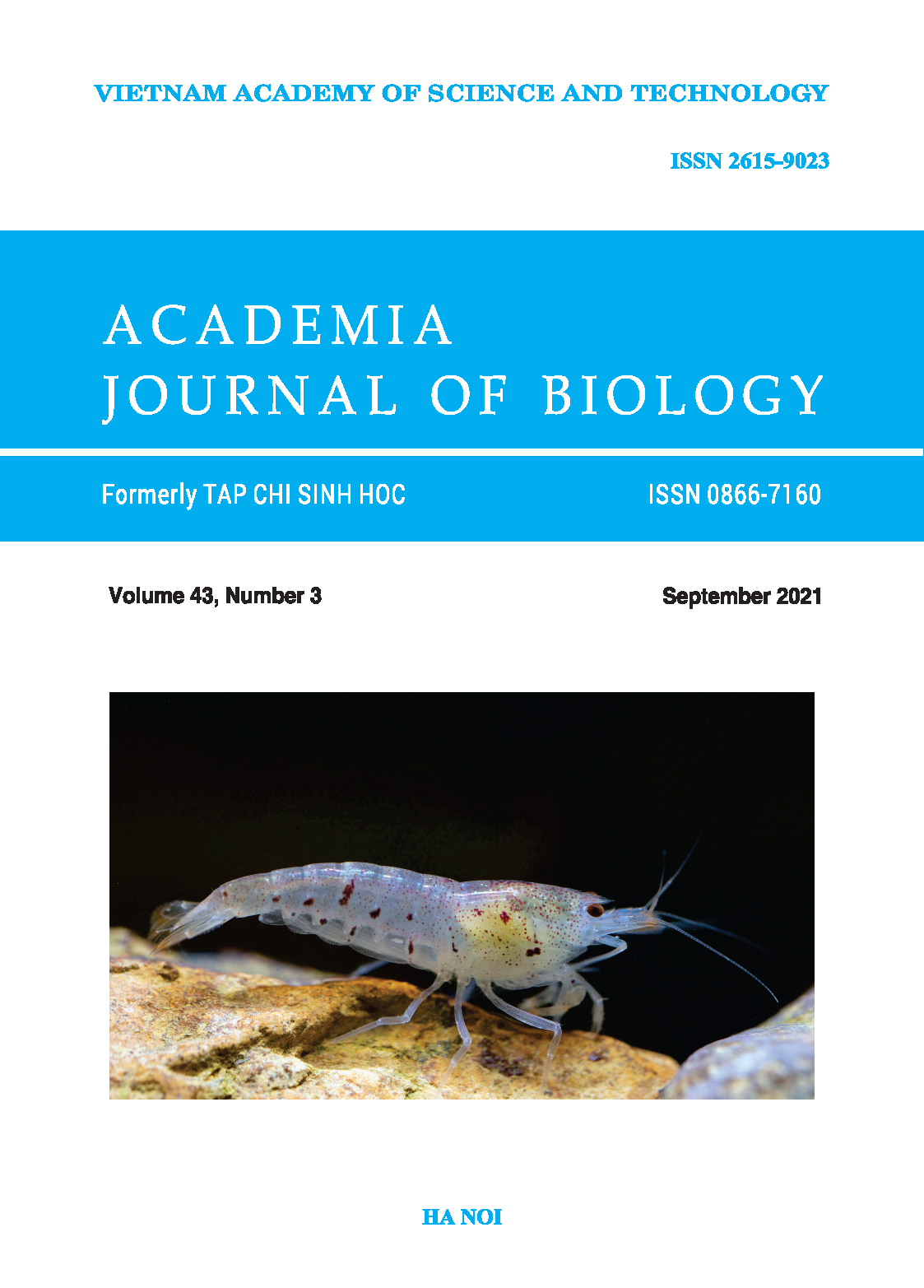Evaluation of the condition for storing pollen grains of japanese melon \(\textit{Cucumis melo}\) L. (Cucurbitaceae)
Author affiliations
DOI:
https://doi.org/10.15625/2615-9023/16161Abstract
In recent years, studies have been carried on the selection and breeding of melon to reduce its production cost. The F1 seeds of this species are usually created by parental lines. Notably, the parental lines are separated from each other to secure the breeding materials. However, there are no studies on establishing suitable conditions for storing pollen grains of Japanese melon Cucumis melo L. In this study, pollen grains of C. melo were dried at 38 oC temperature, for 1.5 hours, which served as the raw materials. After storage in acetone at 5 oC for 3, 5, 7 days, or in liquid nitrogen for 5 days, pollen grains were stained with triphenyl tetrazolium chloride (TTC) to evaluate their viability and pollination ability. Then, the following parameters including pollen grains’ survival rate, morphology analysis of pollen grains, pollen grains’ fruiting rate, fruit weight, firm seed rate, and germination of melon seeds were analyzed. The study results show that the grains’ survival rates were 86.58%, 88.38%, 87.28% or 88.58% in the group stored in acetone for 3, 5, 7 days or liquid nitrogen for 5 days, respectively. The fertilized fruit rate was 100% in the group stored in liquid nitrogen for 5 days. But the rate of germination from firm seeds was highest, with 94.00% in the group stored in acetone for 3 days. The best method is storing the pollen grains in acetone for 3 days.
Downloads
References
Abdelgadir H. A., Johnson S. D., Van Staden J., 2012. Pollen viability, pollen germination and pollen tube growth in the biofluel seed crop Jatropha curcas (Euphorbiaceace). South Africa Journal of Botany, 79: 132−139. https://doi.org/10.1016/j.sajb.2011.10.005
Beyhan N., Serdar U., 2008. Assessment of pollen viability and germinability in some European chestnut genotypes (Castanea sativa L.) Hort. Sci. (Prague), 35(4): 171−178.
Bhat Z. A., Dhillon W. S., Shafi R. H. S., Rather J. A., Mir A. H., Shafi W., Rizwan Rashid, Bhat J. A., Rather T. R., & Wani T. A., 2012. Influence of storage temperature on viability and in vitro germination capacity of pear (Pyrus spp.) pollen. Journal of Agricultural Science., 4(11): 128−135.
Crisp P., Grout B. W. W., 1984. Storage of broccoli pollen in liquid nitrogen, Euphytica, 33(3): 819−823.
Hawkins B. J., Guest H. J., Kolotelo D., 2003. Freezing tolerance of conifer seeds and germinants, Tree physiology, 23(18): 1237−1246.
Iwanami Y., 1973. Acceleration of the growth of Camellia sasanqua pollen by soaking in organic solvent, Plant physiology, 52(5): 508−509.
Karipidis C. H., Douma D., 2009. Tomato pollen storage at freeze and cryogenic temperature-effects on viability and fecundity, In International Symposium on Cryopreservation in Horticultural Species 908: 257−263.
Kumar K. L., Mathur R. K., Sparjanbabu D. S., 2015. Efficacy of organic solvents for medium term storage of oil palm pollen, Agricultural Research Communication Centre, Indian Journal: 516−521.
Perveen A., Qaiser M., 2008. Pollen flora of Pakistan-LVI. Cucurbitaceae, Pakistan Journal of Botany, 40(1): 9.
Sakunnarak N., Coolbear P., Fountain D. W., 1990. Interactions between seed moisture content and solvent damage in seed treatment. of soybeans, In Proceedings Agronomy Society of NZ, 20: 59−66.
Sheffield C. S., Smith R. F., Kevan P. G., 2005. Perfect syncarpy in apple (Malus x domestica ‘Summerland Mclntosh’) and its implications for pollination, seed distribution and fruit production (Rosaceae: Maloideae). Annals of Botany, 95: 583-591.
Stanley R. G., Linskens H. F., 1974. Pollen. Springer-Verlag, Berlin Heidelberg New York, pp. 314.
Zeng-Yu W., Yaxin G., Scott M., Spangenberg G., 2004. Viability and longevity of pollen from transgenic and non-transgenic tall fescue (Festuca arundinacea) (Poaceae) plants. American Journal of Botany 4: 523−530.
Downloads
Published
How to Cite
Issue
Section
License
Academia Journal of Biology (AJB) is an open-access and peer-reviewed journal. The articles published in the AJB are licensed under a Creative Commons Attribution-NonCommercial-NoDerivatives 4.0 International License (CC BY-NC-ND 4.0), which permits for immediate free access to the articles to read, download, copy, non-commercial use, distribution and reproduction in any medium, provided the work is properly cited (with a link to the formal publication through the relevant DOI), and without subscription charges or registration barriers. The full details of the CC BY-NC-ND 4.0 License are available at https://creativecommons.org/licenses/by-nc-nd/4.0/.












